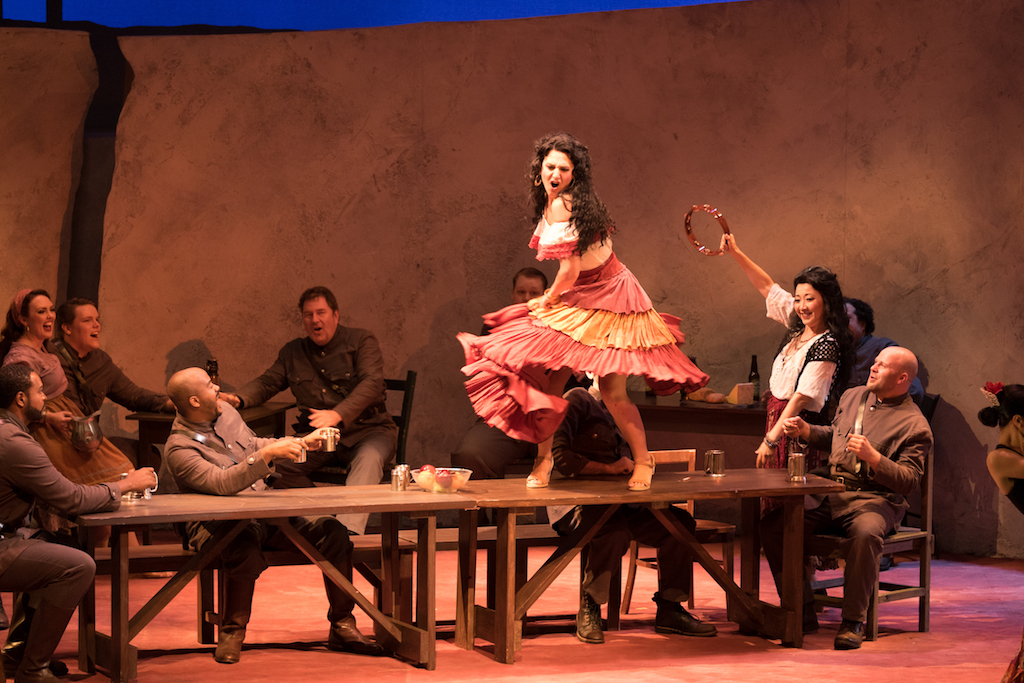PORTopera “Carmen”
Merrill Auditorium
July 27
by Christopher Hyde
Bizet’s “Carmen” can be summed up by a well-known pornographic postcard from the composer’s Paris, in which a beautiful young woman accepts a bouquet from a Romantic lover. A drapery or curtain conceals her lower half, which is receiving the intimate attentions of a well-endowed brute.
In PORTopera’s new production, premiered Wednesday night at Merrill Autditorium, artistic director Dona D. Vaughn has elevated the love-lust dichotomy into to a tragedy worthy of “Macbeth.”
She is ably abetted by a fine orchestra, conducted by Stephen Lord, a cast like that of the Metropolitan Opera, and a set, with its sometimes solid and sometimes broken adobe walls, that mirrors the tragedy. The setting and authentic costumes, from Franco’s Spain of the 1930’s, also make a substantial contribution to Vaughn’s characterizations.
To take just one example, the bullfighter Escamilio’s absurd suit of lights emphasizes his role as Carmen’s ticket out of the gypsy life. He is not an heroic figure but the handsome boy next door, strutting his bravado but totally unsure of himself. Carmen can wrap him around her little finger. unlike Don José, who even wins a knife-fight with the toreador. The role is played with appropriate nonchalance by bass-baritone Edward Parks
If there were ever a mezzo-soprano perfectly suited to sing Carmen, it is Israeli-born Maya Lahyani, who combines a voice to die for with acting ability, beauty and stage presence. She is one of the few Carmens I have seen who makes Don Jose’s and Escamillo’s infatuation entirely believable.
After setting the stage, the tragedy begins when Carmen, uncharacteristically, waits for Don José because he has gone to prison for her. She is trying to break out of the flirtatious, man-killing pattern she has set, but after seducing Don José to join the bandit troop, she begins to regret her decision. Still, she stays with him longer than any other man in her life, until she finds herself outgunned by the traditional world, in the person of Micaëla, allied with Don José’s mother.
Tenor Adam Diegel, as Don José, has just the right mixture of passion and conventionality as the deeply divided anti-hero.
Soprano Amanda Woodbury is spectacular as Micaëla, whose seeming timidity and religiosity disguise a will as strong as Carmen’s and more sure.
Like Macbeth, Carmen consults an oracle about her future, always a bad idea, and finds nothing but death, impossible in the full Tarot deck (I think), reflecting her own subconscious knowledge that she is losing her youth and beauty.
She refuses to give in, and takes up with Escamillo, either as a last fling or an anchor against old age. In the final act we see her and her delightful friends Mercédes, mezzo-soprano Sahoko Sata, and Frasquita, soprano Maeve Höglund, dressed in the 1930s version of Spanish ladies of fashion. Carmen’s wild hair is in a bun, and she is dressed in an outfit that seems sedate, at least for her.
In the final confrontation with Don José, she could easily have diverted his wrath, but decides once more to tempt fate, and defies him, while addressing her persona in the third person: “Carmen never gives in.” It is this hubris that precipitates the tragedy.
After the stabbing, Carmen’s body is surrounded by a squad of soldiers, all with their rifles pointed at her body, and incidentally, her murderer Don José. The scene returns us to the beginning of the opera, in which Carmen is flirting with the same soldiers.
In my rewrite, there’s a happy ending. Don José gets a suspended sentence for a crime of passion, (It’s Spain after all) marries Micaëla and lives happily ever after, his mother having recovered from her terminal illness due to joy at seeing her son again.
Seriously, this version of “Carmen,” the third in the history of PORTopera, will stand as a landmark. Every part of the world’s most popular opera is there, down to the last syllable, through four acts, two intermissions and a pause, but it is riveting throughout. Every role is almost perfectly sung and acted, and the crowd scenes with the children’s chorus set off the tragedy by their sheer exuberance. There are a few seats left for Friday’s performance, and this is an experience worth having, no matter how far up in the balcony one has to sit.
Christopher Hyde is a writer and musician who lives in Pownal. He can be reached at [email protected].

